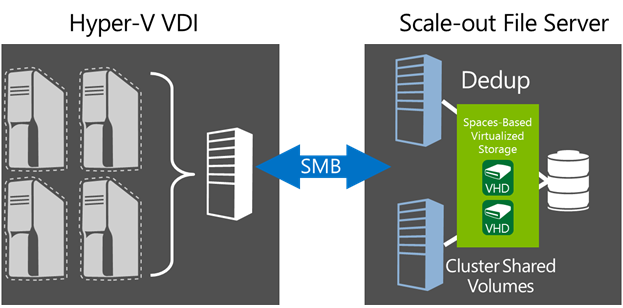Why Windows Server 2012 R2: Reducing the Storage Cost for your VDI Deployments with VHD De-duplication for VDI
My co-worker – Matt Hester brings us the next post in our Windows Server 2012 R2 Launch Blog Series. Matt discusses how leveraging De-duplication technologies in Windows Server 2012 R2 can help dramatically reduce storage cost for VDI solution. Here is a portion of his article -
---------------
With storage needs in your organizations growing exponentially over the last few years and into the future there are plenty of things you may done in the past to help keep the cost down. Chances are you bought some kind of fancy SAN, that had all the bells and whistles to help storage work efficiently. I am willing to bet one of the features your SAN has is data de-duplication.
Windows Server 2012
With Windows Server 2012 we introduced built-in data de-duplication on a per-volume basis. You can save a tremendous amount in storage costs with this powerful addition. Thisde-duplication feature uses data broken into chunks and eliminates duplicates while adding pointers and using advanced mechanisms to provide for and prevent potential data loss. The de-duplication feature also uses a data aging system to ensure that only data that is resident on the volume for greater than 4 days (4 is the default and is adjustable based on your own situation) is de-duplicated to prevent the de-duplication of data that is constantly changing. If you want to take a look at a fantastic example take a look at post from a previous series which shows a de-deplicaiton from 240GB to 7GB:
31 Days of Our Favorite Things- From 240GB to 7 GB De-duplication with Veeam and Windows Server 2012
Windows Server 2012 R2
In Windows Server 2012 R2 we improved this feature even more. In Windows Server 2012 R2, we now support live data de-duplication on VHD’s for VDI. This means that data de-duplication can now be performed on open VHD/VHDX files on remote VDI storage with CSV volume support. Remote VHD/VHDX storage de-duplication allows for increased VDI storage density significantly reducing VDI storage costs, and enabling faster read/write of optimized files and advanced caching of duplicated data.
What’s the big deal?
You can find out by checking out the full original article here -
-Cheers!
